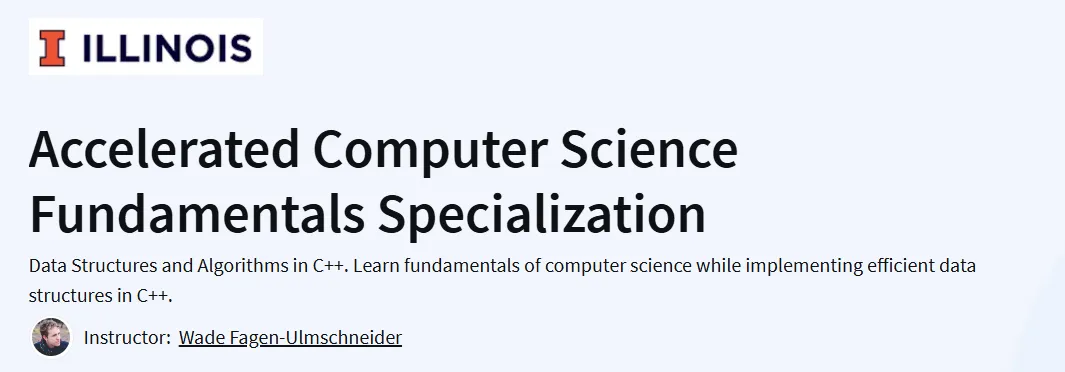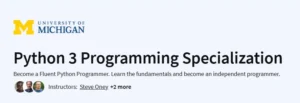Accelerated Computer Science Fundamentals Specialization Course
A comprehensive specialization that equips learners with essential skills in data structures, algorithms, and object-oriented programming using C++.
What will you learn in this Accelerated Computer Science Fundamentals Specialization Course
Object-Oriented Programming in C++: Learn to design and implement programs using C++, encapsulating data structures and algorithms within classes
Data Structures: Understand and implement various data structures, including arrays, linked lists, stacks, queues, trees, heaps, hash tables, and graphs.
Algorithm Analysis: Analyze the running time and space requirements of algorithms to ensure efficiency and scalability.
Problem-Solving Skills: Enhance critical thinking and problem-solving abilities through hands-on projects and coding challenges.
Program Overview
1. Object-Oriented Data Structures in C++
⏳ 21 hours
Set up a C++ development environment.
Implement data structures as C++ classes.
Understand memory management, pointers, and object-oriented principles.
Project: Image processing application.
2. Ordered Data Structures
⏳ 18 hours
Explore linear data structures like arrays, linked lists, stacks, and queues.
Delve into tree structures, including binary trees, AVL trees, and B-trees.
Implement heaps and understand their applications.
Project: Develop and manipulate tree data structures.
3. Unordered Data Structures
⏳ 20 hours
Implement hash tables and understand collision resolution techniques.
Learn about disjoint sets and their applications.
Explore graph representations and traversal algorithms like BFS and DFS.
Project: Graph search and shortest path algorithms.
Get certificate
Job Outlook
Proficiency in data structures and algorithms is fundamental for roles such as Software Engineer, Systems Analyst, and Data Scientist.
The skills acquired in this specialization are applicable across various industries, including technology, finance, healthcare, and more.
Completing this program can enhance your qualifications for advanced studies, such as a Master’s in Computer Science.
Explore More Learning Paths
Advance your understanding of programming, algorithms, and computational logic with these curated courses that perfectly complement the Accelerated Computer Science Fundamentals Specialization Course. Strengthen your foundation and open doors to software engineering, data science, and AI development.
Related Courses
Introduction to Computer Science and Programming Specialization — Build a strong base in computer science concepts, programming logic, and software design through hands-on exercises and real-world examples.
Computer Science 101: Master the Theory Behind Programming — Learn the essential theories that power programming, including algorithms, data structures, and computational models.
Mathematical Thinking in Computer Science — Develop the mathematical reasoning skills necessary for problem-solving, algorithm design, and logical analysis in computer science.
Related Reading
What Is Data Management? — Discover how managing and organizing data effectively supports programming efficiency and computational accuracy across software systems.
- In-depth coverage of fundamental data structures and algorithms.
- Hands-on projects that reinforce theoretical concepts.
- Taught by experienced faculty from a top-ranked computer science department.
- Flexible schedule suitable for working professionals.
- Requires prior programming experience, preferably in C++.
- Some concepts may be challenging for beginners without a strong mathematical background.
Specification: Accelerated Computer Science Fundamentals Specialization Course
|
FAQs
- Yes, it’s designed for learners from non-CS backgrounds.
- Covers core concepts step by step.
- Assumes only basic programming knowledge.
- Builds a foundation for advanced computer science topics.
- Useful for professionals pivoting into tech careers.
- Focuses on practical, accelerated learning.
- Compresses key fundamentals into shorter modules.
- Avoids lengthy theory-heavy coursework.
- Emphasizes hands-on coding and problem-solving.
- Acts as a bridge rather than a full replacement for a degree.
- Software engineering roles needing algorithmic skills.
- Data science and analytics positions requiring problem-solving.
- Cybersecurity, where systems knowledge is critical.
- Product management with a technical focus.
- Graduate programs or bootcamps requiring a CS foundation.
- Requires basic algebra and logical reasoning.
- No advanced calculus or discrete math needed upfront.
- Introduces data structures and algorithms in an applied way.
- Uses coding exercises to explain mathematical ideas.
- Builds comfort with logical problem-solving instead of heavy theory.
- Specialization is designed for accelerated completion.
- Learners may finish in 2–4 months with steady effort.
- Skills can be applied immediately in coding projects.
- Provides a springboard to more advanced CS courses.
- Faster learning curve than traditional programs.





